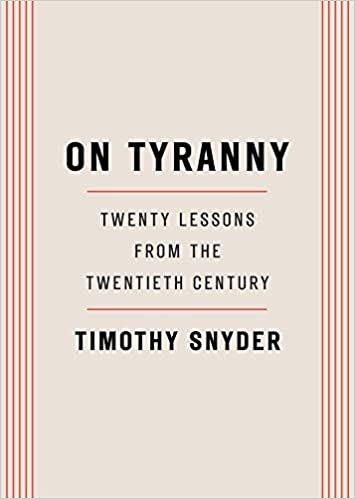Timothy Snyder – On Tyranny Audiobook
Timothy Snyder – On Tyranny Audiobook (Twenty lessons from the Twentieth Century).

On Tyranny Audiobook Online
This publication is an essential read for anyone interested in learning from the mistakes of past tyrants and asking of our representatives to ensure that they do not repeat these same mistakes. book. On Tyranny Audiobook Free. It was not the first book I read. I was worried that the writer might have a program and wanted to get me to see the points through his lens. After five pages, I realized that this was not the case. A truly incomplete history is a sign of something. book is to be a complete guide, and have no idea about the political events that the writer refers to. When I did this, it was also the case. It is what it should be. The book This book was written with great skill by an author who has a considerable knowledge on the subject. It was also read in one evening. It was so captivating that I could not put the book down. It was recommended to me by two different courts, a criminal and household judge. Now my entire workplace has read it. This publication is a must-read for anyone who cares about learning about and not repeating past blunders. This publication is short and easy to read, perhaps 30 pages.-45 minutes of your precious time. It’s only $2.99 on Kindle so you won’t regret buying it. For those who couldn’t find his 20 points anywhere else on the internet, freeDon’t let this be enough. You must be the best. book It adds some commentary to his list and is worth the small fee.
You may not be familiar with SnyderHe’s a chronicler and writer about Eastern Europe. In fact, he has written extensively on the turmoil — the murder areas– of Eastern Europe in 20th-century. He is able to understand what he says.
I will share with you some of his ideas, taken from his closing remarks. He remembers that “the politics and certainty” is what he refers to when he tries to solve the problem.
We Americans were convinced that there would be no future but more of the exact same up until recently. The faraway-The effects of fascism and Nazism as well as communism seemed to be fading away into insignificance. We were able to accept the politics and certainty that suggested history might be moving in one direction: toward liberal democracy. After communism ended in eastern Europe in 1989–91, we adopted the myth of “the end of background”. This allowed us to lower our defenses and constrained our imaginations. It also broke the ice for specific routines we believed we could never return.
Snyder, Timothy. On Tyranny: Twenty Lessons From the Twentieth Century (Kindle Places 765).-769). Crown/Archetype. Kindle Edition.
He then discusses the opposite perspective, which he refers to as “the politics of infinite.” This mindset is discussed by he.
The temptation of a mythicized past in national politics of eternity prevents us thinking about futures. The tendency to dwell on victimhood reduces the desire for self-correction. The country is defined by its core virtue rather than its future potential. This means that national politics becomes a discussion about excellent and also bad instead of discussing practical solutions to real problems. The situation is permanent, so the feeling of an emergency is constant. Planning for the future is difficult and disloyal. How can we think about reform when our adversary is always at our doorstep?
Id. at 810-815
Contrary to both of these attitudes, however, he puts background (an encomium which I could not disagree more):
These two placements, inevitability as well as eternity, are both antihistorical. History is all that stands between them. History allows us see patterns and makes judgments. It shows us the structures that allow for flexibility. It uncovers moments, each of them unique and none completely one.-This is-A-kind. Understanding one moment is to be able to cocreate another. Timothy Snyder – On Tyranny Audio Book Online. History allows us to be responsible. The Polish poet Czesław Miłosz assumed that such an idea of obligation worked against loneliness and also indifference. We can learn from the experiences of those who have gone through more than we have. This discredits the illusion that freedom is a given in America or any other country. The following is a detail that keeps me thinking: SnyderThe debate about the evisceration and humiliation of privacy is an older fascist strategy. You can see why the cyber brown ts are using doxing as a tool when they look at the recent email breach of the political election.-shirts. A further factor is the terrible and long history of dismantling rule and regulation protections as “exemptions”, which have quickly become a lengthy tradition.-term– Due to security “emergencies”. This could be a test for Americans sooner than expected. It is possible for democracy to become totalitarianism within a matter of months.
